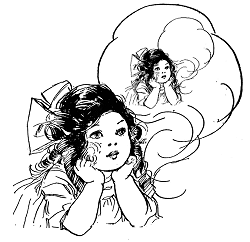 Thinking without concepts is a strange idea at first sight; isn’t it always the concept of a thing that’s involved in thought, rather than the thing itself? But I don’t think it’s really as strange as it seems. Without looking too closely into the foundations at this stage, I interpret conceptual thought as simply being one level higher in abstraction than its non-conceptual counterpart.
Thinking without concepts is a strange idea at first sight; isn’t it always the concept of a thing that’s involved in thought, rather than the thing itself? But I don’t think it’s really as strange as it seems. Without looking too closely into the foundations at this stage, I interpret conceptual thought as simply being one level higher in abstraction than its non-conceptual counterpart.
Dogs, I think, are perfectly capable of non-conceptual thinking. Show them the lead or rattle the dinner bowl and they assent enthusiastically to the concrete proposal. Without concepts, though, dogs are tied to the moment and the actual; it’s no good asking the dog whether it would prefer walkies tomorrow morning or tomorrow afternoon; the concept cannot gain a foothold – nothing more abstract than walkies now can really do so. That doesn’t mean we should deny a dog consciousness – the difference between a conscious and unconscious dog is pretty clear – only to certain human levels. The advanced use of language and symbols certainly requires concepts, though I think it is not synonymous with it and conceptual but inexplicit thought seems a viable option to me. Some, though, have thought that it takes language to build meaningful self-consciousness.
Kristina Musholt has been looking briefly at whether self-consciousness can be built out of purely non-conceptual thought, particularly in response to Bermudez, and summarising the case made in her book Thinking About Oneself.
Musholt suggests that non-conceptual thought reflects knowledge-how rather than knowledge-that; without quite agreeing completely about that we can agree that non-conceptual thought can only be expressed through action and so is inherently about interaction with the world, which I take to be her main pointer.
Following Bermudez it seems we are to look for three things from any candidate for self-awareness; namely,
(1) non-accidental self-reference,
(2) immediate action relevance, and
(3) immunity to error through misidentification.
That last one may look a bit scary; it’s simply the point that you can’t be wrong about the identity of the person thinking your own thoughts. I think there are some senses in which this ain’t necessarily so, but for present purposes it doesn’t really matter. Bermudez was concerned to refute those who think that self-consciousness requires language; he thought any such argument collapses into circularity; to construct self-consciousness out of language you have to be able to talk about yourself, but talking about yourself requires the very self-awareness you were supposed to be building.
Bermudez, it seems, believes we can go elsewhere and get our self-awareness out of something like that implicit certainty we mentioned earlier. As thought implies the thinker, non-conceptual thoughts will serve us perfectly well for these purposes. Musholt, though broadly in sympathy, isn’t happy with that. While the self may be implied simply by the existence of non-conceptual thoughts, she points out that it isn’t represented, and that’s what we really need. For one thing, it makes no sense to her to talk about immunity from error when it applies to something that isn’t even represented – it’s not that error is possible, it’s that the whole concept of error or immunity doesn’t even arise.
She still wants to build self-awareness out of non-conceptual thought, but her preferred route is social. As we noted she thinks non-conceptual thought is all about interaction with the world, and she suggests that it’s interaction with other people that provides the foundation for our awareness ourselves. It’s our experience of other people that ultimately grounds our awareness of ourselves as people.
That all seems pretty sensible. I find myself wondering about dogs, and about the state of mind of someone who grew up entirely alone, never meeting any other thinking being. It’s hard even to form a plausible thought experiment about that, I think. The human mind being what it is, I suspect that if no other humans or animals were around inanimate objects would be assigned imaginary personalities and some kind of substitute society cobbled up. Would the human being involved end up with no self-awareness, some strangely defective self-awareness (perhaps subject to some kind of dissociative disorder?), or broadly normal? I don’t even have any clear intuition on the matter.
Anyway, we should keep track of the original project, which essentially remains the one set out by Bermudez. Even if we don’t like Musholt’s proposal better than his, it all serves to show that there is actually quite a rich range of theoretical possibilities here, which tends to undermine the view that linguistic ability is essential. To me it just doesn’t seem very plausible that language should come before self-awareness, although I think it does come before certain forms of self-awareness. The real take-away, perhaps, is that self-awareness is a many-splendoured thing and different forms of it exist on all the three levels mentioned and surely more, too. This conclusion partly vindicates the attack on language as the only basis for self-awareness, undercutting Bermudez’s case for circularity. If self-awareness actually comes in lots of forms, then the sophisticated, explicit, language-based kind doesn’t need to pull itself up by its bootstraps, it can grow out of less explicit versions.
Anyway, Musholt has at least added to our repertoire a version of self-awareness which seems real and interesting – if not necessarily the sole or most fundamental version.
